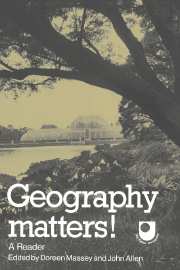Book contents
- Frontmatter
- Contents
- Acknowledgements
- Part 1 Introduction: Geography matters
- 1 A history of nature
- 2 The societal conception of space
- Part 2 Introduction: Analysis: aspects of the geography of society
- Part 3 Introduction: Synthesis: interdependence and the uniqueness of place
- Part 4 Introduction: Geography and society
- Index
2 - The societal conception of space
Published online by Cambridge University Press: 05 June 2012
- Frontmatter
- Contents
- Acknowledgements
- Part 1 Introduction: Geography matters
- 1 A history of nature
- 2 The societal conception of space
- Part 2 Introduction: Analysis: aspects of the geography of society
- Part 3 Introduction: Synthesis: interdependence and the uniqueness of place
- Part 4 Introduction: Geography and society
- Index
Summary
We have concentrated on the essential symbolic structures of modes of thought that are potentially a part of the intellectual capacities of individuals in all societies. These modes are social in the sense that individuals producing them are influenced by society and the organizations or communities to which they belong. These social conditions undoubtedly affect the contents of the modes and the degree to which they are separate and distinct. There are, however, realms of activities that are predominantly group, collective or social, and in which the individuals act in the name of the group. Nations, cities, armies, families and scientific, religious and artistic organisations are examples of collective or social relationships or facts. These facts are linked to space in two related ways. First, the social organisations and the individuals within them are ‘in’ space and their interactions have spatial manifestations. Thus we have families in cities, and cities in regions containing other cities, and so on. Analysing these relationships has been the traditional concern of social geography and has resulted in such theories as central place, land use, and the gravity and potential models.
Second, social organisations are often territorial, a fact largely overlooked by all but some political geographers. Territoriality here does not mean the location and extension in space of a social organisation or of its members. Rather it means the assertion by an organisation, or an individual in the name of the organisation, that an area of geographic space is under its influence or control.
- Type
- Chapter
- Information
- Geography Matters!A Reader, pp. 34 - 48Publisher: Cambridge University PressPrint publication year: 1984
- 2
- Cited by



